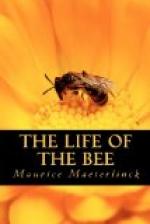Profound truth has not this poetry, but possesses another that we are less apt to grasp, which, however, we should end, perhaps, by understanding and loving. Nature has not gone out of her way to provide these two “abbreviated atoms,” as Pascal would call them, with a resplendent marriage, or an ideal moment of love. Her concern, as we have said, was merely to improve the race by means of crossed fertilisation. To ensure this she has contrived the organ of the male in such a fashion that he can make use of it only in space. A prolonged flight must first expand his two great tracheal sacs; these enormous receptacles being gorged on air will throw back the lower part of the abdomen, and permit the exsertion of the organ. There we have the whole physiological secret—which will seem ordinary enough to some, and almost vulgar to others—of this dazzling pursuit and these magnificent nuptials.
[89]
“But must we always, then,” the poet will wonder, “rejoice in regions that are loftier than the truth?”
Yes, in all things, at all times, let us rejoice, not in regions loftier than the truth, for that were impossible, but in regions higher than the little truths that our eye can seize. Should a chance, a recollection, an illusion, a passion,—in a word, should any motive whatever cause an object to reveal itself to us in a more beautiful light than to others, let that motive be first of all dear to us. It may only be error, perhaps; but this error will not prevent the moment wherein this object appears the most admirable to us from being the moment wherein we are likeliest to perceive its real beauty. The beauty we lend it directs our attention to its veritable beauty and grandeur, which, derived as they are from the relation wherein every object must of necessity stand to general, eternal, forces and laws, might otherwise escape observation. The faculty of admiring which an illusion may have created within us will serve for the truth that must come, be it sooner or later. It is with the words, the feelings, and ardour created by ancient and imaginary beauties, that humanity welcomes today truths which perhaps would have never been born, which might not have been able to find so propitious a home, had these sacrificed illusions not first of all dwelt in, and kindled, the heart and the reason whereinto these truths should descend. Happy the eyes that need no illusion to see that the spectacle is great! It is illusion that teaches the others to look, to admire, and rejoice. And look as high as they will, they never can look too high. Truth rises as they draw nearer; they draw nearer when they admire. And whatever the heights may be whereon they rejoice, this rejoicing can never take place in the void, or above the unknown and eternal truth that rests over all things like beauty in suspense.
[90]




